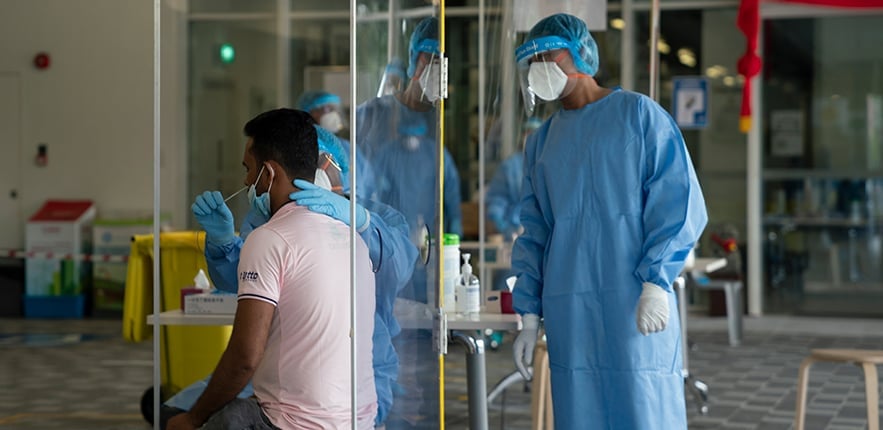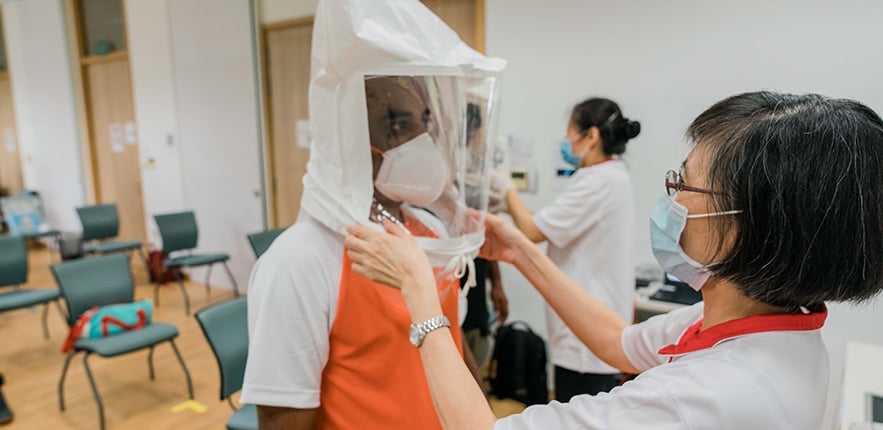Swabs and Scrubs: A Rapid Response to COVID-19
Large-scale testing is key to keeping communities secure and industries moving. By training staff volunteers to screen for COVID-19, we're building strong, resilient communities.
As a Principal Safety Officer with local construction firm Woh Hup, Faizal Aris is right at home with a hand drill. A swab stick, however, proved a different kind of challenge — especially when the other end was going into a colleague's nostril.
“Now, swabbing is easy to do. But in the beginning, it was quite scary,” recalls the 33-year-old father of three, who was trained by medical professionals as part of Temasek's Oneself-Swab-Oneself (OSO) initiative.
Once a fortnight, Faizal trades his hard hat, safety boots, and vest for Personal Protective Equipment (PPE) of a different sort, overseeing a swabbing team of almost 50 Woh Hup staff at Kim Chuan Lodge, one of the three dormitories the company owns. They are among the 120 Woh Hup staff who run four dedicated swabbing centres around Singapore, and who have been trained to ensure that the swabbing of some 2,000 project site staff and sub-contractors are carried out properly and safely.

Woh Hup itself is among seven companies partnering Temasek for the OSO initiative. The list, mostly from the Construction, Marine and Process (CMP) sectors, also includes China Construction, Keppel Infrastructure, Sembcorp Marine, ST Engineering Marine, Straits Construction, and security solutions provider Certis.
Between them, they have around 350 volunteers conducting an average of 9,000 swabs a week. As of May 31, 2021, they had performed close to 244,000 COVID-19 screenings.
All Hands on Deck
It was early 2020 and COVID-19 was spreading especially quickly in Singapore's migrant worker dormitories, putting some 320,000 migrant workers at risk. At the outbreak's peak in April, more than 1,000 new cases were being detected in the dormitories daily.
“There was an urgent need for large numbers of workers to be safely, efficiently, and regularly tested. We see safeguarding communities as a natural part of our role as a steward of the community — and with our vast ecosystem, we had the means to help,” says Ben Gan, a Director of Investment at Temasek, who was part of its OSO team of 16. This would allow for work to resume safely, and for these critical sectors to regain some level of normalcy.

Temasek first helped with roping in private healthcare providers and medical groups to conduct swabbing at their medical facilities, community sites, as well as worksites and dorms. It then went on to help secure the necessary testing equipment.
“We found ways to complement the government's swabbing efforts on the national front,” says Gan.
But there were other gaps to address.
One of the crisis' biggest shortfalls was medical manpower — there was an urgent need to train more people to swab, especially if testing was going to be an ongoing need.
There was an urgent need for large numbers of workers to be safely, efficiently, and regularly tested. We see safeguarding communities as a natural part of our role as a steward of the community — and with our vast ecosystem, we had the means to help.
Ben Gan
Director, Investment
Temasek
The idea of self-managed testing had been raised in Temasek's internal brainstorms as early as March, and it was during those sessions that the initiative also got its nickname — “oneself-swab-oneself”.
“It was something we used casually, but it stuck. People began calling the programme OSO,” laughs Gan.
Getting from presenting the idea to the relevant authorities to setting up the on-site swabbing centres took just a little over one month.
“Once the authorities gave us the green light to proceed, we organised training sessions for the volunteers from the various companies, and partnered them with established healthcare providers for the operations,” says Kassandra Tan, an Assistant Vice President with Temasek's Organisation & People team. “Everyone was committed — both the trainers and the trainees. They understood the importance of what they were doing, and took their responsibilities very seriously.”

Home-health service providers Jaga-Me, Home Nursing Foundation and Homage as well as private medical facilities The Good Life Medical Center and Parkway Hospitals got volunteer swabbers up to speed on all the essentials.
This ranged from how to safely put on and take off PPEs and get rid of biohazardous waste, to swabbing procedures and the Oropharyngeal and Mid-Turbinate (OPMT) swab technique, which is used to conduct the polymerase chain reaction (PCR) tests to detect genetic sequences of COVID-19.
Despite its intimidating name, the technique itself is not difficult. But it requires the swabber to be confident, and the person being swabbed to be relaxed, says Julian Koo, CEO and Co-founder of Jaga-Me. “A good job is one that collects the sample as painlessly as possible, and to achieve that, you need to coax the person being swabbed that it will be ok,” he explains.
And while many wanted to help, not everyone was as comfortable with wielding a swab stick.
“We got better after a while, and now swabbing is second nature,” says Eric Tan, Group Head of HR at Woh Hup, adding that OSO resulted in more than just saved time and increased control. “When our staff realise it's our own people swabbing them, they are less tense, and the experience becomes much nicer. They are proud of our swab team.”
No One-Size-Fits-All Solution
Meanwhile, the Temasek team got busy setting up swabbing centres within dormitories and worksites, and putting safety protocols in place.
Finding — and setting up — appropriate swabbing sites was not always easy.
At Certis' Paya Lebar headquarters, Temasek's first OSO site, the most suitable place was a futsal court on the roof of its seven-storey building, so a massive tent and other equipment had to be hoisted to the top.
By August, over 30 volunteers had stepped up to man swabbing stations that could test up to 3,000 Certis frontliners deployed to serve Quarantine Orders and provide security at quarantine facilities. Care was taken to ensure other building users did not cross paths with either group.
With this success under their belt, the OSO programme was then rolled out to the other companies, adapted to the size of their workforces and facilities, as well as the nature of their businesses. Some converted multi-storey carparks and communal areas into swabbing sites, and while several fully took on swabbing responsibilities, others hired additional swabbers.
Throughout, Temasek has remained the sector's “pandemic buddy”, as Woh Hup's Tan puts it. “Ben and the team listen and understand, before suggesting what to do. Whether its operational concerns like PPE suppliers, or better and safer testing regimes, we can bounce off ideas and learn a lot from each other.”
Getting from Zero to One
According to Jaga-Me's Koo, the first month was a “fight through the storm”, both in terms of getting the systems in place and the swabbers up to speed.
That included the Temasek team on the ground, which itself needed to be trained to oversee the OSO operations until they reached a “steady-state”, adds Gan.
Because worksites and dormitories were located in far-flung areas across Singapore, it sometimes meant being up at 5am to get to them by 7am. In some instances, the team only caught up with their day jobs at dinnertime, after a rigorous scrub down.
Stronger Together
As testing solutions and challenges evolve, so has OSO.
At some of its sites, Temasek is spearheading pilots for newer, faster, and more comprehensive testing, including antigen rapid tests (ARTs), saliva-based PCR tests, and even self-swabbing. The companies involved tap on each other for help, and work together to address longer-term concerns, including the need to bring in more manpower safely.
For those involved, there remains a shared sense of pride in coming together to keep workers on the ground, and the country running.
“It was challenging initially. There was a lot of pressure to ensure the swabbing was done safely and efficiently, and that everyone understood their roles and the requirements. But there is a lot of meaning in what we are doing,” says Gan.
“It has been very rewarding.”
Certis, Keppel, Sembcorp, and ST Engineering are Temasek portfolio companies.



